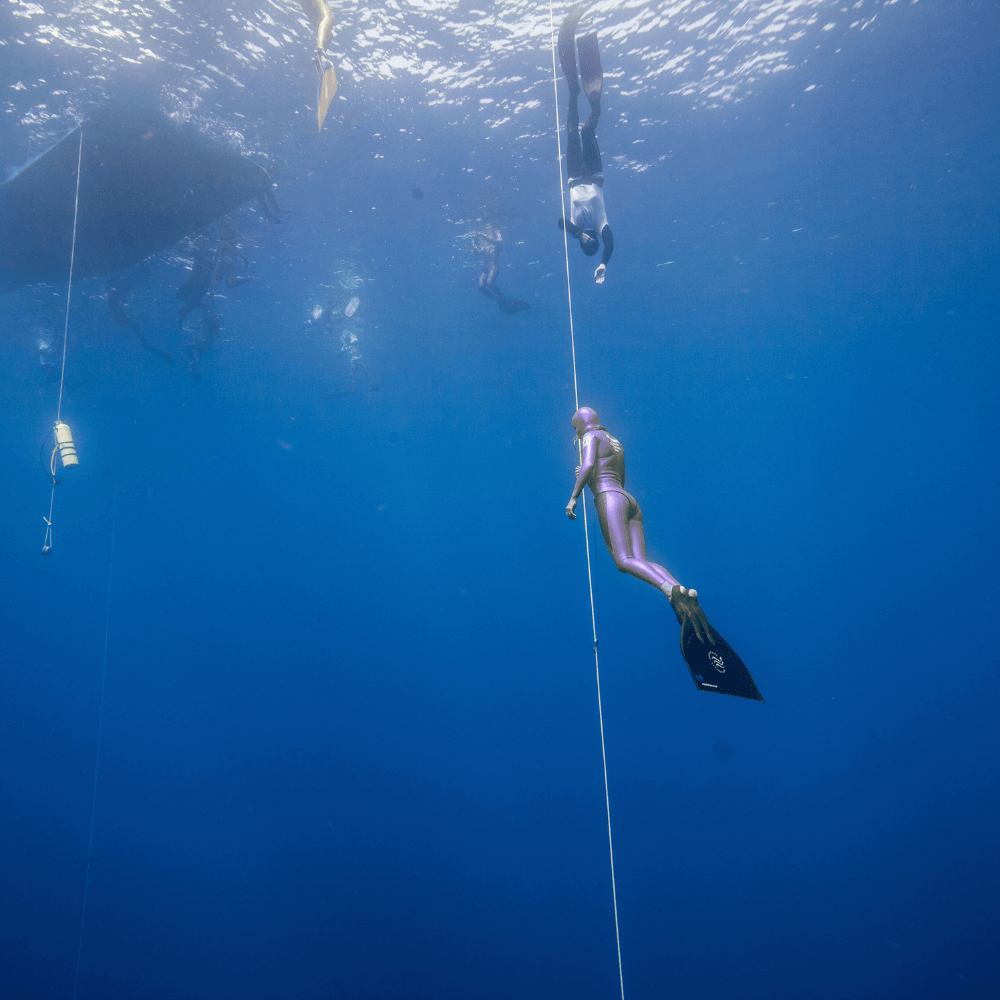How to Put On and Take Off a Wetsuit
Follow the guide below for putting on and removing Molchanovs freediving wetsuits. This will ensure that your wetsuit maintains its integrity, elasticity, and thermal qualities over time.
Putting on a wetsuit
Glide skin outside / open cell inside (PRO Wetsuit Unlined)
When putting on a wetsuit with glide skin outside and open cell inside, we recommend using lubricant (see ‘Lubricant’ below for our suggested mixture). You must take extra care to avoid excessive pulling due to limited tear resistance. Freedivers with long nails must be very cautious to avoid accidentally puncturing the wetsuit material. We recommend having a friend who is familiar with the delicate nature of the wetsuit to help you put it on.
- Seal the open ends of the wetsuit and pour lubricant (see ‘Lubricant’ for our suggested mixture) inside.
- Move the wetsuit around thoroughly to ensure lubricant touches every part of the inner material.
- When pulling the wetsuit on, it should slide easily over your body. To adjust the placement, gently smooth the areas that need adjusting (do not grab and pull). Avoid accidentally puncturing the wetsuit with your nails.
- Rinse the inside of the wetsuit with freshwater to finish.
Glide skin outside / fabric inside (PRO/SPORT Wetsuit Inside-Lined)
Putting on wetsuits with fabric inside can be done in-water or on your dry body. Make sure to adjust the placement by smoothing the area (do not grab and pull). Avoid accidentally puncturing the wetsuit with your nails.
Fabric outside / open cell inside (PRO/SPORT Wetsuit Outside-Lined)
Wetsuits that have fabric outside and open cell inside are more durable and require less delicacy. They may be put on in-water or by using lubricant.
Lubricant
In a bottle, mix 1 part hair conditioner to 2 parts water (e.g. 100ml hair conditioner to 200ml water). Adjust the ratio as desired to fit your needs.
Removing the wetsuit
Glide skin or fabric outside / open cell inside (PRO Wetsuit Unlined)
Removing a wetsuit with open cell inside must be done with water. It is important to have enough water between folded parts of the wetsuit to avoid any friction or tension. We recommend having a friend who is familiar with the delicate nature of the wetsuit to help you remove it, if necessary.
- For two-piece wetsuits, remove the top first by putting on the hood and folding up the waist.
- Fill the waist with water and reach behind you to grab the ‘tail’ of the wetsuit.
- Pull off over your head in one swift motion.
- When removing the pants, fold the waist down.
- Hook your thumbs on the inside and grab the folded area with straight fingers (not grabbing with your fingernails).
- Pull off in one swift motion.
Glide skin outside / fabric inside (PRO/SPORT Wetsuit Inside-Lined)
You can remove a wetsuit with fabric inside or outside on dry land, but in-water will be easier and more comfortable.
Wetsuit care
PRO Wetsuits
Due to the high-quality performance materials used in our PRO wetsuit line, you must take extra care when donning and removing the wetsuit. We do not recommend wearing PRO wetsuits for extended amounts of time under direct sunlight. If you must wear a PRO wetsuit for a long period of time, we recommend wearing a protective fabric t-shirt on top of the wetsuit to shield the glide skin layer.
All wetsuits
- You must thoroughly rinse your wetsuit in fresh water directly after every dive. If you do not have a chance to do so, leave your wetsuit in a bag with some seawater. Do not let salt water dry on your wetsuit and do not machine wash.
- After rinsing in fresh water, allow your wetsuit to air dry. Do not dry your wetsuit in the sun, near a fire, near central heating systems, or in a clothes dryer.
- If you’ll be wearing a wetsuit for a long time under the sun, we recommend wearing a protective fabric t-shirt over it.
- From time to time, you should wash your wetsuit with a wetsuit-specific shampoo. Follow directions closely. Remove grease, oil, and other stains using a wetsuit-specific degreaser. Never use petroleum products on your wetsuit.
- Store your dry wetsuit in a cool, dry place and avoid folding it for excessive periods. Folding a wetsuit for short-term transport is acceptable - otherwise, we recommend laying it flat or hanging it on a hanger that does not stretch out the wetsuit. Avoid storing it in direct sunlight.
- If you tear your wetsuit, use Neoprene Cement to repair it, which is commercially available at most diving centers or watersports stores. Follow the instructions carefully. Never sew smooth skin seams. Fabric-finished surfaces can be loop stitched, but avoid stitching completely through to the opposite surface. If you have doubts about repairing your wetsuit, contact us by email at support@molchanovs.com - we'll happily assist you.



